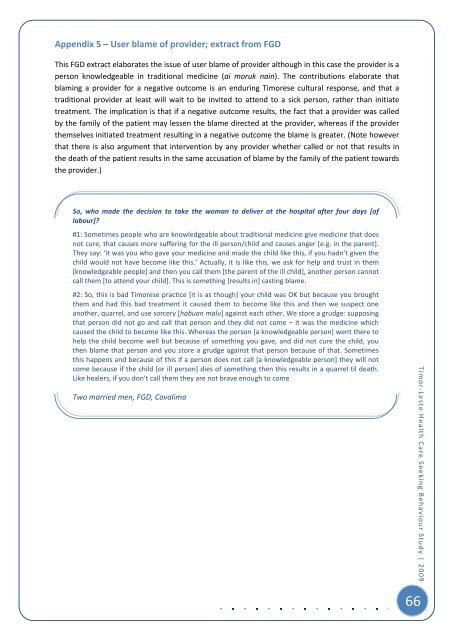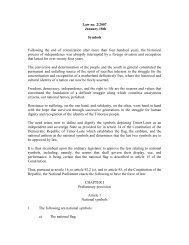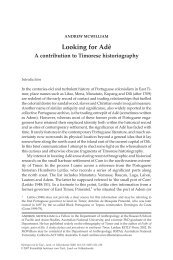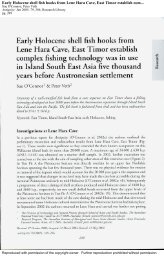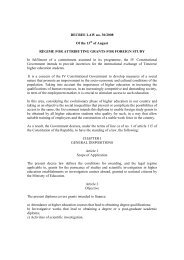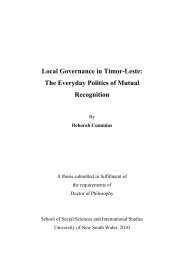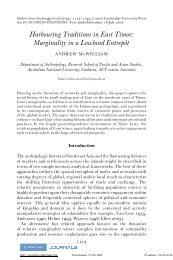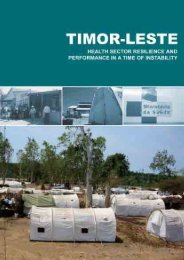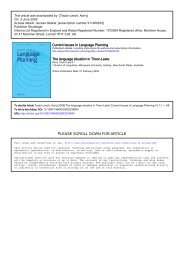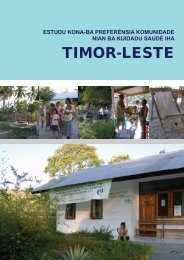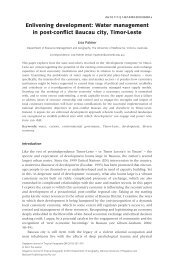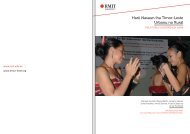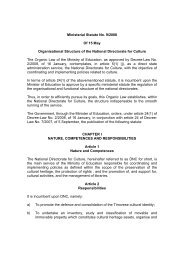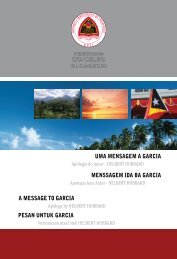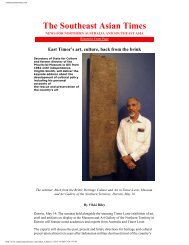Timor-Leste Health Care Seeking Behaviour Study - Secretaria de ...
Timor-Leste Health Care Seeking Behaviour Study - Secretaria de ...
Timor-Leste Health Care Seeking Behaviour Study - Secretaria de ...
- No tags were found...
Create successful ePaper yourself
Turn your PDF publications into a flip-book with our unique Google optimized e-Paper software.
Appendix 5 – User blame of provi<strong>de</strong>r; extract from FGDThis FGD extract elaborates the issue of user blame of provi<strong>de</strong>r although in this case the provi<strong>de</strong>r is aperson knowledgeable in traditional medicine (ai moruk nain). The contributions elaborate thatblaming a provi<strong>de</strong>r for a negative outcome is an enduring <strong>Timor</strong>ese cultural response, and that atraditional provi<strong>de</strong>r at least will wait to be invited to attend to a sick person, rather than initiatetreatment. The implication is that if a negative outcome results, the fact that a provi<strong>de</strong>r was calledby the family of the patient may lessen the blame directed at the provi<strong>de</strong>r, whereas if the provi<strong>de</strong>rthemselves initiated treatment resulting in a negative outcome the blame is greater. (Note howeverthat there is also argument that intervention by any provi<strong>de</strong>r whether called or not that results inthe <strong>de</strong>ath of the patient results in the same accusation of blame by the family of the patient towardsthe provi<strong>de</strong>r.)So, who ma<strong>de</strong> the <strong>de</strong>cision to take the woman to <strong>de</strong>liver at the hospital after four days [oflabour]?#1: Sometimes people who are knowledgeable about traditional medicine give medicine that doesnot cure, that causes more suffering for the ill person/child and causes anger [e.g. in the parent].They say: ‘it was you who gave your medicine and ma<strong>de</strong> the child like this, if you hadn’t given thechild would not have become like this.’ Actually, it is like this, we ask for help and trust in them[knowledgeable people] and then you call them [the parent of the ill child], another person cannotcall them [to attend your child]. This is something [results in] casting blame.#2: So, this is bad <strong>Timor</strong>ese practice [it is as though] your child was OK but because you broughtthem and had this bad treatment it caused them to become like this and then we suspect oneanother, quarrel, and use sorcery [habuan malu] against each other. We store a grudge: supposingthat person did not go and call that person and they did not come – it was the medicine whichcaused the child to become like this. Whereas the person [a knowledgeable person] went there tohelp the child become well but because of something you gave, and did not cure the child, youthen blame that person and you store a grudge against that person because of that. Sometimesthis happens and because of this if a person does not call [a knowledgeable person] they will notcome because if the child [or ill person] dies of something then this results in a quarrel til <strong>de</strong>ath.Like healers, if you don’t call them they are not brave enough to comeTwo married men, FGD, Covalima<strong>Timor</strong>-<strong>Leste</strong> <strong>Health</strong> <strong>Care</strong> <strong>Seeking</strong> <strong>Behaviour</strong> <strong>Study</strong> | 200966


